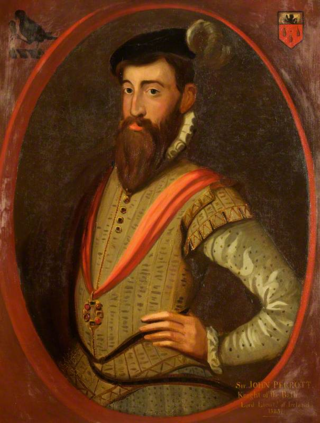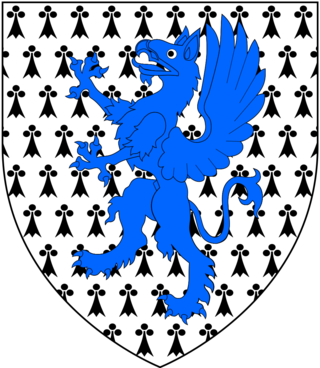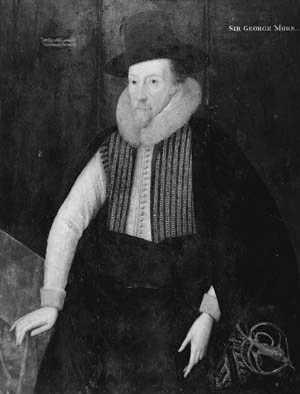Related Research Articles
Aldersgate is a Ward of the City of London, England, named after one of the northern gates in the London Wall which once enclosed the City.

Sir John Perrot was a member of the Welsh gentry who served as Lord Deputy of Ireland under Queen Elizabeth I of England during the Tudor conquest of Ireland. It was formerly speculated that he was an illegitimate son of King Henry VIII, though the idea is rejected by modern historians.
Sir John Perrot, was a figure of unusual power and influence in Tudor Britain and Ireland. Born near Haverfordwest in 1528, he inherited wealth and power – the Perrots had been accumulating both in west Wales for centuries – and gained more ingratiating himself with the English court.
His own son described him as a "very cholericke" man, who "could not brooke any crosses". He had already gathered many offices by the time he was sent to Ireland in 1571 as President of Munster to suppress a rebellion. His methods were characteristically violent – he hanged over 800 of the rebels – but he resigned after two years, having failed in his mission.
Back in west Wales he contented himself with self-enrichment and self-glorification, rebuilding in grand style his two main homes, Carew Castle and Laugharne Castle. He returned to Ireland as 1584 as Lord Deputy, with the task of crushing the Irish and colonising their land. Again unsuccessful, he returned, was falsely accused of treason by his many enemies, and died in the Tower of London in 1592, possibly of poisoning.
Groom of the Chamber was a position in the Household of the monarch in early modern England. Other Ancien Régime royal establishments in Europe had comparable officers, often with similar titles. In France, the Duchy of Burgundy, and in England while French was still the language of the court, the title was varlet or valet de chambre. In German, Danish and Russian the term was "Kammerjunker" and in Swedish the similar "Kammarjunkare".
Events from the year 1676 in England.

Francis Aungier, 1st Baron Aungier of Longford (1558–1632), also known as Lord Aungier, was the progenitor of the Earldom of Longford, member of the House of Lords, Privy Councillor for Ireland and Master of the Rolls in Ireland under James I and Charles I.

John Harington, 2nd Baron Harington of Exton, of Burley-on-the-Hill, Rutland was a young English peer and politician. He was the Lord Lieutenant of Rutland and Baron Harington of Exton.

Sir Robert Croke was an English lawyer and politician who sat in the House of Commons between 1640 and 1643.

Sir George More was an English courtier and politician who sat in the House of Commons at various times between 1584 and 1625.

The Board of Ordnance in the Kingdom of Ireland (1542–1800) performed the equivalent duties of the British Board of Ordnance: supplying arms and munitions, overseeing the Royal Irish Artillery and the Irish Engineers, and maintaining the fortifications in the island.

Sir Henry Croke was an English landowner, office holder and politician who sat in the House of Commons at various times between 1614 and 1629.

Sir William More, of Loseley, Surrey, was the son of Sir Christopher More. The great house at Loseley Park was built for him, which is still the residence of the More Molyneux family. Of Protestant sympathies, as Sheriff and Vice-Admiral of Surrey he was actively involved in local administration of the county of Surrey and in the enforcement of the Elizabethan religious settlement, and was a member of every Parliament during the reign of Queen Elizabeth I. He was the owner of property in the Blackfriars in which the first and second Blackfriars theatres were erected. He has been described as "the perfect Elizabethan country gentleman" on account of his impeccable character and his assiduity and efficiency of service.
Sir John Wolley was Queen Elizabeth I's Latin Secretary, a member of her Privy Council, and a member of Parliament from 1571 until his death in 1596.
The Mayor of Gloucester is the first citizen of the City of Gloucester, England, and acts as chair of the council. The Mayor represents the Council and the City at civic, ceremonial and community events both inside the City boundaries and elsewhere.
Elizabeth Wolley was one of Queen Elizabeth I's ladies of the Privy Chamber. She was the eldest daughter of Sir William More of Loseley, Surrey, and his second wife, Margaret Daniell, and the wife of the Queen's Latin secretary, Sir John Wolley, and the Queen's Lord Chancellor, Thomas Egerton, 1st Viscount Brackley.
Sir Francis Wolley was the son of Queen Elizabeth's Latin secretary, Sir John Wolley, and Elizabeth More, the daughter of Sir William More of Loseley, Surrey. He was a Member of Parliament, and one of those to whom King James granted the Second Virginia Charter. From 1601 to 1609 he provided a home at Pyrford for John Donne and Anne More after their clandestine marriage.
Sir Thomas Perrot was an Elizabethan courtier, soldier, and member of parliament. He campaigned in Ireland and the Low Countries, and was involved in the defence of England against the Spanish Armada. He was imprisoned several times, on one occasion to prevent a duel with Sir Walter Raleigh, and on another occasion because of his secret marriage to Dorothy Devereux, a Lady-in-waiting to the Queen, and sister of the Queen's favourite, the Earl of Essex. Perrot's only daughter, Penelope, married Sir Robert Naunton, author of Fragmenta Regalia, which claimed that Perrot's father, Sir John Perrot, was an illegitimate son of Henry VIII.

Sir John Parsons of The Priory, Reigate, Surrey, was an English brewer, Royal Navy victualler and Tory politician, who sat in the English and British House of Commons between 1685 and 1717. He was Lord Mayor of London in 1703.

Sir John Eyre (1580–1639), initially of Great Chalfield Manor, Wiltshire and later of St. Giles-in-the-Fields, Middlesex was an English courtier, ambassador and Member of Parliament.
Sir William Corbet, 5th Baronet (1702–1748), of Stoke, Shropshire was a British merchant and politician who sat in the House of Commons from 1728 to 1748.
Richard Weston (1564-1613) was MP for Petersfield in the 1593 parliament.
References
- ↑ Warren Governance pp. 73–74
- ↑ Chrimes Administrative History p. 60
- ↑ "Pipe rolls entry Archived 2009-12-31 at the Wayback Machine " Websters Online Dictionary
- ↑ The history of the worthies of England who for parts and learning have been eminent in the several counties : together with an historical narrative of the native commodities and rarities in each county / endeavoured by Thomas Fuller. Fuller, Thomas, 1608-1661 (pub. 1662). Printed by J.G.W.L. and W.G. for Thomas Williams (1662)
- ↑ "Parish Fraternity Register: Fraternity of the Holy Trinity and SS. Fabian and Sebastian (parish of St. Botolph without Aldersgate)". British History Online. Archived from the original on 21 July 2012. Retrieved 2 June 2017.
{{cite web}}: CS1 maint: bot: original URL status unknown (link) - 1 2 "SMITH, Christopher (by 1510-89), of London and Annables, Herts". History of Parliament Online. Retrieved 10 May 2017.
- ↑ "MORLEY, John I (d.1587), of Halnaker, Suss. and St. Botolph-without-Aldersgate, London". History of Parliament Online. Retrieved 11 May 2017.
- ↑ "MORRISON, Thomas (d.1592), of Cadeby, Lincs. and St. Botolph-without-Aldersgate, London". History of Parliament Online. Retrieved 1 June 2017.
- ↑ Goldring, Elizabeth. John Nichols's The Progresses and Public Processions of Queen Elizabeth. p. 489.
- ↑ "STAFFORD, Sir Edward (c.1552-1605), of Cannon Row, Westminster". History of Parliament Online. Retrieved 1 June 2017.
- ↑ "WOLLEY, Francis (1583-1609), of Pyrford, Surr". History of Parliament Online. Retrieved 10 May 2017.
- ↑ "JARVIS, Arthur (1570-at least 1638), of Brentwood in South Weald, Essex and Cripplegate and Smithfield, London". History of Parliament Online. Retrieved 10 May 2017.
- ↑ "MAINWARING, Sir Arthur (c.1580-1648), of Pyrford, Surr.; later of Sayes Park, Chertsey, Surr". History of Parliament Online. Retrieved 1 June 2017.
- 1 2 3 "CROKE, Henry (1588-1660), of Hampton Poyle, Oxon. and Chequers, Ellesborough, Bucks". History of Parliament Online. Retrieved 10 May 2017.
- ↑ "CROKE, Robert (c.1636-71), of Chequers, Ellesborough, Bucks". History of Parliament Online. Retrieved 10 May 2017.
- ↑ "RUSSELL, Hon. Robert (c.1644-1703), of Covent Garden, Mdx". History of Parliament Online. Retrieved 10 May 2017.
- 1 2 "CHEYNE, Hon. William (1657-1728), of Chesham Bois, Bucks". History of Parliament Online. Retrieved 10 May 2017.
- ↑ Cooper, Thompson. . Dictionary of National Biography . Vol. 12. pp. 90–91.
- ↑ "FARRER, William (?1656-1737), of Biddenham, Beds". History of Parliament Online. Retrieved 10 May 2017.
- ↑ "CORNISH, Anthony (aft.1688-1728), of St. James's, Westminster". History of Parliament Online. Retrieved 10 May 2017.
- ↑ "HENLEY, Henry Holt (d.1748), of Leigh, Som., and Colway, Lyme Regis, Dorset". History of Parliament Online. Retrieved 10 May 2017.
- ↑ "CORBET, William (1702-48), of Stoke, Salop". History of Parliament Online. Retrieved 10 May 2017.
- ↑ "ARUNDELL, Hon. Richard (c.1696-1758), of Allerton Mauleverer, Yorks". History of Parliament Online. Retrieved 10 May 2017.
- ↑ "SHELLEY, John (?1730-83), of Mitchelgrove, Suss". History of Parliament Online. Retrieved 10 May 2017.
- ↑ Taylor, Charles. The Literary Panorama, Volume 10. p. 1411.
